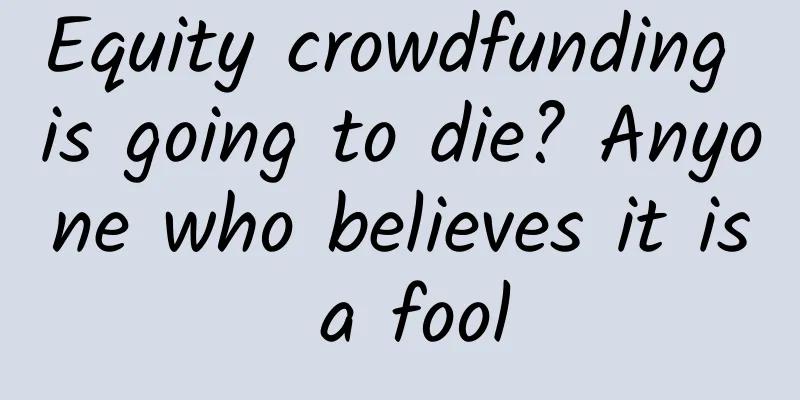Equity crowdfunding is going to die? Anyone who believes it is a fool

|
As soon as the Equity Crowdfunding Financing Management Measures (Trial) - hereinafter referred to as the "Equity Crowdfunding Management Measures" or "Management Measures" - were released last night, they were immediately reported by the media all over the Internet. A large number of reports and interpretations were filled with silly headlines such as "The threshold is too high", "Supervision is too strict", "Equity Crowdfunding is a pill", and some so-called authorities or experts put forward suggestions that sounded perfect, such as "Replace the investor entry threshold with a regulation on the proportion of investment to assets", "Restrict the number of people instead of the amount, and restrict the amount instead of the number of people", etc. When I saw these overwhelming false reports this morning, what I thought was not that equity crowdfunding should be regulated, but that financial journalists should be purged. Careful students may find that almost all the comments published in newspapers and on the Internet today are not from the most authoritative people in the industry. There are at least 20 equity crowdfunding platforms in China. The two earliest and largest ones, Angel Capital and Venture Capital Circle, said nothing. The rising star Yuanshihui, which was established in 2013, also said nothing. According to the 2014 Internet Equity Crowdfunding Report, these three large platforms can be regarded as the first echelon of the industry, occupying more than 80% of the market share. Now he is so silent, it seems that he is waiting to die silently... Anyone who believes it is a fool. What is equity crowdfunding? Equity crowdfunding is still far from being one of the mainstream financing methods in China today. Before the issuance of the equity crowdfunding management measures, it was always suspected to be illegal fundraising. In fact, if there is a problem with the operation, it will still become illegal fundraising. This thing is regulated by the China Securities Regulatory Commission. Because large investment institutions will be involved in financing after the A round, equity crowdfunding is mainly concentrated in the angel round stage. People can generally understand it as "the Internet upgrade of private equity" or "massive multiplayer online angel investment." In other words, it is a narrow investment and financing behavior. As long as it is an investment and financing behavior, it naturally involves risks. What are the risks of angel investing? The legendary one-for-ten. Invest in ten projects, nine fail and one wins, and you get a return. It is more exciting than P2P with a return of more than 50%. Considering the large number of failed projects, the average return of domestic angel investment is about 30%. People who have read the stories of domestic angel investment mentors who became rich overnight know that the return of a single project is probably dozens or hundreds of times; that is to say, more than 90% of the projects fail... Compared to the stock market? In this country where the stock market has a big sign saying "Stock market is risky, enter the market with caution", in this country where people are keen on bank deposits and disdain insurance, and often return to the pre-liberation era after a disease, it is easy to see how low people's sensitivity to risk is. You talk up the risks of angel investment, and the result that most people understand is nothing more than "Oh! The profit is a hundred times." So you're saying this is a game suitable for ordinary people to play? Don’t think that equity crowdfunding has the word “众” in its name, which means “众”. Some people disagree and tell me, “Hey, crowdfunding means anyone can participate. The light bulb I raised on JD.com the other day has been sent to me and it works fine except that it doesn’t light up.” Let’s first clarify the difference between equity crowdfunding and reward crowdfunding. Equity crowdfunding is a way to obtain investment and a type of investment and financing behavior, as I just mentioned. Reward-based crowdfunding is a pre-sale, a group purchase, and a consumption behavior, which is fundamentally different from investment. “A whale is not a fish.” Just understand it this way. In China, where old ladies who lose money on stocks will cry, make a scene, or even hang themselves, people only care about money and not risk. If you let them blindly participate in equity crowdfunding, just wait for the news that "the office building of the equity crowdfunding platform was set on fire by hundreds of people just because they didn't pay their debts" to appear. You say, hey, it's not equity, how can it become a debt? I can say that many media and individuals who issued articles criticizing the management measures today obviously can't distinguish between equity and debt. Of course, this doesn't mean that they really can't tell the difference, or that they have problems with their IQ or knowledge reserves (of course, this is not ruled out). Please take your time to guess, and I won't punish you. If I have to say it, any new regulations issued by China will be criticized, and this understanding seems to be correct. Crowdfunding threshold in the United States Let’s take a look at the US JOBS Act (the US equity crowdfunding law)’s regulations on investors: Differentiate between certified and non-certified investors, and set limits on the amount of money a single investor is allowed to invest in equity crowdfunding companies within 12 months. For non-certified investors with an annual income or net worth of less than $100,000, the Jobs Act sets an investment cap of $2,000, or 5% of annual income/net worth, whichever is higher. For certified investors with an annual income or net worth of more than $100,000, the Jobs Act sets an investment cap of 10% of annual income or net worth, but not more than $100,000. This is equivalent to the government stopping losses for investors and controlling their maximum loss limit. It is not politically correct to say that Americans are more rational in facing risks, but I don't think it is fair to say that the Chinese handle risks more appropriately. So at least learn from advanced examples, and then you tell me that there should be no threshold for investors. Do you have a conscience? And the smart students may have discovered that the investment cap set by the Jobs Act is actually very difficult to enforce. You cannot control investors from making multiple investments on multiple platforms. Oh, yes, it is difficult to enforce in the United States, and it is impossible to enforce in some countries where individual taxes cannot be collected. You are pretending to set such a complicated threshold. Does Occam's razor know? It is really better to calculate the net assets directly. It is simple and crude. If you can’t even play angel investing, don’t play online angel investing. Who are angel investors? If you say they are wealthy people, then you don’t understand the industry at all. Domestic angel investors are basically successful former entrepreneurs, senior executives of well-known companies, or people who have been working in the investment and financing industry for many years, such as Lei Jun, Zhou Hongyi, and Wang Sicong. Even if they are not well-known, they are early Facebook employees who received tens of millions of dollars and returned to China to have fun. They can’t be poor anymore. Objectively speaking, it's not just because of money. They have the ability to judge projects, and they have status and position. Even if a project fails, it can be attributed to an expected but unreasonable failure, and everyone can part ways in peace, rather than "I don't want to listen, I don't want to listen, I don't want to listen to your explanation." Even with the Internet, equity crowdfunding cannot reverse the huge information asymmetry in the industry, nor can it improve your awareness of risks and your ability to judge projects. If you can't even handle offline angel investment, the consequences of blindly investing online are more terrible than being scammed on the Internet. It's also for the good of the business. Entrepreneurs are not stupid. There are so many rich people in China, and the money is the same, so why not choose the awesome ones? Is it the same if Dai Zhikang invests in you or Zhou Yongkang invests in you (well, at least it is definitely not the same today)? It is not only about raising money, but also about raising endorsements, in other words, raising a sense of security - marriage cannot only focus on money. In fact, the investment institution resources, government resources, channel resources, talent resources, and media resources behind the investors are all things that most entrepreneurs do not have. The investors' own awesome technology, awesome management experience, and awesome foresight can also bring great help to entrepreneurs, which is much better than a group of ordinary people really playing the so-called crowdfunding. You said it won’t delay anything, but what on earth will it delay? Those who have invested in you are your shareholders. Uncle Wang, who sells eggs next door, has become your shareholder and wants to guide your company on how to become a new generation of O2O. The corporate direction of Internet Fried Eggs was submitted at the shareholders' meeting - can you bear it? You really can't just look at the money. Even if it's not such an extreme example, if a tycoon from a different industry from the entrepreneur gives you a huge investment, your company will suffer the tragedy of amateurs guiding professionals, and it's only a matter of time before you go bankrupt. In addition, entrepreneurs have an obligation to disclose information to shareholders. If your shareholder team is a mixed bag, the possibility of your information spreading will increase infinitely. If one of your shareholders invests in both you and your competitor, you are doomed. So you really think this won't work? Equity crowdfunding is really only for the rich and handsome. Ordinary people are not in the "crowd". If you don't believe me, go and check the investor certification rules of the three major platforms. It's not too late to come back and criticize me. Who is going to die? Just like the group buying shuffle, the best ones survive and the others all die. Look at the so-called authoritative figures you interviewed. They are all CEOs of platforms in the second, third, fourth and fifth echelons of the domestic equity crowdfunding industry who are the ones who get to enjoy the benefits. Now that the industry is booming and the fire is turning, they can’t get any of the benefits and they have to say that the pot is leaking. Oh, you also said that state-owned securities firms will also intervene The first echelon is also going to die, right? In fact, the dozens of equity crowdfunding platforms in China only cover Beijing, Shanghai, Guangzhou and Shenzhen in terms of region. There are about 10 in Beijing, and the three largest ones are all here. Investment and financing are not something that can be done by playing around on the Internet. In fact, it is still difficult for foreign projects to obtain financing through existing platforms. The addition of securities companies is good news for entrepreneurs across the country, which benefits the country and the people. As for whether the first echelon will die... This market is actually quite large. Considering that the country has been promoting entrepreneurship in the past two years, the cake will get bigger and bigger. I can only say that there is still room for the first echelon to turn around and maneuver. Whether they can survive in the not-too-tough competition depends on their skills. Really, in any industry, the best practitioners will not be killed by a self-regulatory regulation...they are already ahead of the regulations. As a winner of Toutiao's Qingyun Plan and Baijiahao's Bai+ Plan, the 2019 Baidu Digital Author of the Year, the Baijiahao's Most Popular Author in the Technology Field, the 2019 Sogou Technology and Culture Author, and the 2021 Baijiahao Quarterly Influential Creator, he has won many awards, including the 2013 Sohu Best Industry Media Person, the 2015 China New Media Entrepreneurship Competition Beijing Third Place, the 2015 Guangmang Experience Award, the 2015 China New Media Entrepreneurship Competition Finals Third Place, and the 2018 Baidu Dynamic Annual Powerful Celebrity. |
<<: Can Android replicate the glory of Windows?
>>: Smart home access to mobile customer service professional platform construction is the key
Recommend
Why do cats love to eat mice? Will they get sick if they eat mice? If they get sick, can they infect humans?
Why do cats catch mice? Is it for fun? Of course ...
Is your understanding of the “mixed” COVID-19 vaccine correct?
Xinhua News Agency, Beijing, February 21 (Reporte...
Is there any pattern in the arrangement of galaxies, fractal or random?
Where do galaxies change and is there any pattern...
Operational methodology: How to attract new users?
Operational methodology is the foundation for bui...
How should Tik Tok create a hit? Official TikTok hit tips!
The rise of short videos has brought countless ne...
Kunshan Social Insurance Fund Management Center: National Internet Security Management Service Platform!
In order to protect network information security,...
Wang Yuanjian Introduction: Will the age of the website domain name affect SEO optimization?
Everyone is familiar with domain name trust, espe...
The digital advertising landscape in 2022 (Part 2)
The digital advertising landscape in 2022 (Part 1...
QQ's 20th year: slimming down, becoming bloated, and being challenged by WeChat
The sound of "Ding Ding Ding..." arouse...
How does Baidu bidding charge? Is there any contact information?
Baidu’s paid promotion is charged based on clicks...
Baidu Ai Purchasing service fee, how much is the entry fee to Baidu Ai Purchasing?
Now many manufacturing industries have shifted th...
The data logic behind the year-end growth of APP
The global app economy is in a period of rapid gr...
Brand marketing trends in 2020!
2019 has passed by quickly, but it has left many ...
GAC Aion brand opens a new era of independence, and the super-law smart pure electric SUV Aion Y is launched globally
On November 20 , the 2020 (18th) Guangzhou Intern...
37 years later, killer whales are using dead salmon as hats again | Nature Trumpet
Welcome to the 71st issue of the Nature Trumpet c...









